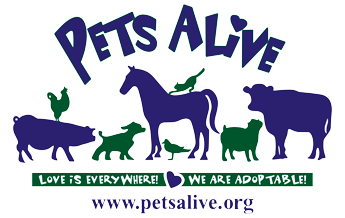Found injured wildlife?
Pets Alive is not a licensed wildlife facility or rehabilitator, so we cannot take in injured or orphaned wildlife, however, here is some useful information in the event you find injured or orphaned wildlife.
How to help an injured animal
If the baby is visibly injured, its mother has been attacked by a house pet or other animal, or you have seen the baby’s condition worsen over a couple of days, you should contact a wildlife rehabilitator to get expert assistance.
Call your local licensed wildlife rehabilitated for assistance as soon as possible.
The wildlife rehabilitator will give you detailed instructions, but here are some safety tips to keep in mind.
- Safety: Animals will bite or scratch. Wear gloves or use a towel to pick the animal up.
- Quiet: Reducing noise around the animal reduces stress on the animal.
- Dark: Darkness also reduces stress for the animal.
- Warm: Sick or infant wildlife may have trouble keeping warm. Place the animal on a towel over a heating pad or by a warm water bottle, no hotter than you’d use for a human baby.
- Do not try to feed it or give it water; you could do more harm than good.
- Leave the animal alone; don’t handle or bother it.
- Keep children and pets away.
- Don’t keep the animal at your home longer than necessary.
- Keep the animal in a container (if a small animal); don’t let it loose in your house or car.
If You Have to Transport the Animal
- Prepare a container. Place a soft cloth on the bottom of a cardboard box or cat/dog carrier with a lid. If it doesn’t have air holes, make some. For smaller animals, you can use a paper sack with air holes punched in it.
- Protect yourself. Wear gloves, if possible. Some animals may bite or scratch to protect themselves, even if sick; wild animals commonly have parasites (fleas, lice, ticks) and carry diseases.
- Cover the animal with a light sheet or towel.
- Gently pick up the animal and put it in the prepared container.
- Warm the animal if it’s cold out or if the animal is chilled. Put one end of the container on a heating pad set on low. Alternatively, fill a zip-top plastic bag, plastic soft drink container with a screw lid, or a rubber glove with hot water; wrap warm container with cloth, and put it next to the animal. Make sure the container doesn’t leak as the animal will get wet and chilled.
- Tape the box shut or roll the top of the paper bag closed.
- Note exactly where you found the animal. This will be very important for release of the animal once it is healed.
- Keep the animal in a warm, dark, quiet place.
- Wash your hands after contact with the animal. Wash anything the animal was in contact with – towel, jacket, blanket, pet carrier – to prevent the spread of diseases and/or parasites to you or your pets.
NOTE: It is illegal in most states to possess or raise a wild animal without a permit unless you are transporting that animal to a licensed wildlife rehabilitator.
